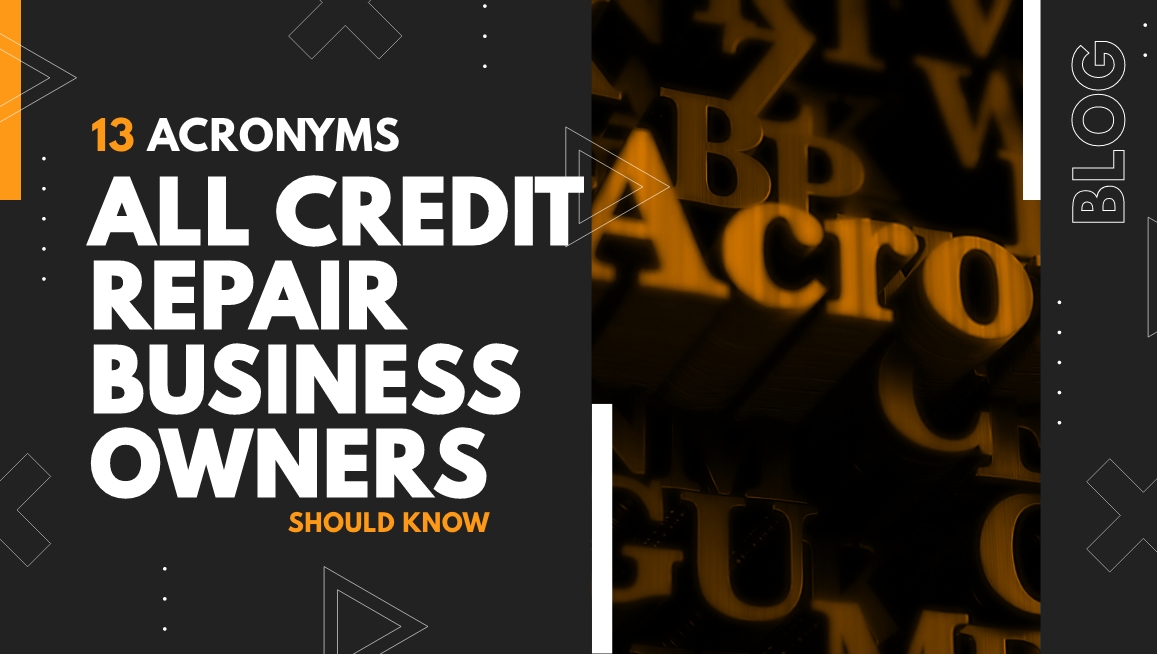13 Acronyms All Credit Repair Business Owners Should Know (2025 Update)
by Waqar Khalid
May 7, 2025
06:03 PM

If you’re new to the credit repair industry, you’ll quickly realize it’s filled with legal terms, financial lingo, and government acronyms. Understanding these acronyms isn’t just helpful — it’s essential for building a compliant and professional credit repair business.
Whether you’re drafting client documents, analyzing credit reports, or dealing with credit bureaus, these 13 acronyms will appear again and again in your day-to-day operations. Bookmark this guide and refer back to it whenever you need a quick refresher.
-
C&D – Cease and Desist
A Cease and Desist (C&D) letter is a formal written request to a party (often a debt collector) to stop engaging in a certain activity — usually contacting the consumer. Under the Fair Debt Collection Practices Act (FDCPA), consumers have the right to send C&D letters to third-party debt collectors to stop communication.
Why it matters: Credit repair businesses often assist clients in drafting legally appropriate C&D letters to protect them from harassment.
-
CC – Credit Card
A Credit Card (CC) is a financial tool that allows consumers to borrow funds from a credit issuer to make purchases or pay bills, with the promise to repay the borrowed money, often with interest.
Why it matters: Many credit report issues stem from missed credit card payments. Understanding how credit card usage impacts credit scores helps you educate your clients.
-
CR – Credit Report
A Credit Report (CR) is a detailed record of a consumer’s borrowing history and credit behavior compiled by credit reporting agencies. It includes accounts, balances, payment history, inquiries, public records, and derogatory marks.
Why it matters: This is the foundational document for credit repair work. You’ll need to analyze it thoroughly to identify disputable items.
-
CRA – Credit Reporting Agency
A Credit Reporting Agency (CRA), also called a credit bureau, is a company that collects, manages, and distributes credit information. The three major CRAs in the U.S. are Equifax, Experian, and TransUnion.
Why it matters: Dispute processes and credit audits are routed through these agencies. Your business must follow each CRA’s specific guidelines to remain compliant.
-
CROA – Credit Repair Organizations Act
The Credit Repair Organizations Act (CROA) is a federal law that protects consumers from deceptive practices in credit repair. It requires businesses to provide written contracts, clear disclosures, and prohibits upfront payment for services.
Why it matters: Every credit repair company must be compliant with CROA. Violating it can lead to lawsuits and penalties. Make sure your onboarding, contracts, and communications meet legal standards.
-
Derog – Derogatory Mark
A Derogatory Mark (Derog) refers to a negative item on a credit report, such as a late payment, charge-off, collection account, foreclosure, or bankruptcy. These marks significantly reduce credit scores.
Why it matters: Identifying, validating, and potentially disputing derogatory marks is at the heart of credit repair work.
-
FCBA – Fair Credit Billing Act
The Fair Credit Billing Act (FCBA) protects consumers from unfair billing practices and provides a mechanism for addressing billing errors related to credit card and revolving credit accounts.
Why it matters: If your client has unauthorized charges or billing errors, the FCBA allows you to guide them through the formal dispute process — improving both accuracy and score.
-
FCRA – Fair Credit Reporting Act
The Fair Credit Reporting Act (FCRA) governs how credit information is collected, accessed, used, and disputed. It gives consumers the right to dispute inaccurate or outdated information and mandates data furnishers to respond.
Why it matters: Your business depends on this law. All dispute letters, audits, and removals must adhere to FCRA timelines and rules.
-
FDCPA – Fair Debt Collection Practices Act
The Fair Debt Collection Practices Act (FDCPA) sets rules for how third-party debt collectors must interact with consumers. It prohibits practices such as calling late at night, threatening legal action without merit, or misrepresenting debts.
Why it matters: Credit repair professionals should educate clients on their rights under the FDCPA and help report violations if they occur.
-
FICO – Fair Isaac Corporation
FICO is the company that developed the most widely used credit scoring model in the U.S. FICO Scores range from 300 to 850 and are used by lenders to evaluate creditworthiness.
Why it matters: FICO scores are central to your client’s financial recovery journey. Understanding how FICO scores are calculated helps you create better strategies for clients.
-
FTC – Federal Trade Commission
The Federal Trade Commission (FTC) is a government body that enforces consumer protection laws. It regulates industries like credit repair, debt settlement, and telemarketing.
Why it matters: The FTC can investigate your company if you don’t comply with CROA, the TSR (Telemarketing Sales Rule), and other federal laws. Stay informed by reviewing their guidelines and enforcement actions.
-
POR – Proof of Residence
Proof of Residence (POR) is documentation that verifies where someone lives. Common examples include utility bills, lease agreements, or government correspondence.
Why it matters: When submitting disputes, CRAs or data furnishers may request a POR to validate a client’s identity and address, especially when disputing public records or identity fraud.
-
SS – Social Security
Social Security (SS) refers to the federal program that provides retirement, disability, and survivor benefits. For credit repair, the Social Security Number (SSN) is a key identifier used to access a person’s credit file.
Why it matters: Always handle SSNs with extreme care. Your business must implement strict data security protocols to remain compliant with privacy laws and build client trust.
Stay Compliant and Confident
Mastering these acronyms empowers you to communicate more effectively with clients, lenders, and credit bureaus. It also ensures you’re operating within the legal boundaries of the credit repair industry.
Every term listed here connects to a regulation, process, or action you’ll use regularly — so make it part of your team’s onboarding, training materials, and client education resources.
Need More Tools for Your Credit Repair Business?
Head over to our Plan Your Business section, where you’ll find templates, compliance checklists, onboarding guides, and more resources to help your credit repair company grow — the right way.
References:
- Cease and Desist (C&D)
- Credit Card (CC)
- Credit Report (CR)
- Credit Reporting Agency (CRA)
- Credit Repair Organizations Act (CROA)
- Derogatory Mark (Derog)
- Fair Credit Billing Act (FCBA)
- Fair Credit Reporting Act (FCRA)
- Fair Debt Collection Practices Act (FDCPA)
- FICO
- Federal Trade Commission (FTC)
- Proof of Residence (POR)
- Social Security (SS)
- Plan Your Business
Table of Contents
Explore More Insights
Dive deeper into a wealth of knowledge. Discover a multitude of articles covering diverse topics, expert perspectives, and the latest trends. Feed your curiosity and expand your understanding.




